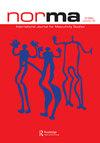渴望野兽般的男子气概:质疑日本同性恋粉丝对“硬汉”K-pop偶像的渴望
IF 1.5
Q2 SOCIOLOGY
引用次数: 0
摘要
先前关于日本K-pop消费的研究主要集中在中年女性粉丝的经历上,她们将K-pop偶像理想化为“软”的男性气质。根据人种学的田野调查,这篇文章探讨了日本男同性恋是如何消费和理解韩国流行音乐的。我通过批判性地调查日本同性恋K-pop粉丝如何将韩国男子气概定位为“野兽”,打破了关于日本K-pop粉丝对男性偶像软男子气概的普遍假设。“我特别研究了同性恋粉丝如何将韩国男子气概置于构建日本同性恋文化的‘打字’社会符号学体系中。”我证明,与在日本流传的关于K-Pop偶像的柔软性的常识性假设相反,日本同性恋粉丝专注于他们的“硬度”,以战略性地区分他们对男性K-Pop偶像的渴望与异性恋女性消费者的渴望。渴望“野兽般的”韩国男子气概的日本同性恋K-pop粉丝因此明确拒绝了日本主流媒体对男性可爱的评价。本文章由计算机程序翻译,如有差异,请以英文原文为准。
Yearning for beastly masculinity: interrogating Japanese gay fans’ desires for ‘hard’ male K-pop idols
ABSTRACT Previous research on Japanese K-pop consumption has predominantly focused on the experiences of middle-aged female fans who idealize K-pop idols’ supposed ‘soft’ masculinity. Drawing upon ethnographic fieldwork, this article explores how Japanese gay men consume and understand K-pop. I destabilize assumptions common to the literature on Japanese fandom for K-pop concerning male idols’ soft masculinity by critically investigating how gay Japanese K-pop fans position Korean masculinity as ‘beastly.’ I particularly investigate how gay fans situate Korean masculinity within the socio-semiotic system of ‘Typing’ that structures Japan’s gay culture. I demonstrate that, counter to common-sense assumptions of K-Pop idols’ softness which circulate in Japan, Japanese gay fans instead focus on their ‘hardness’ to strategically differentiate their desires for male K-Pop idols from those of heterosexual female consumers. In yearning for ‘beastly’ Korean masculinity, Japanese gay K-pop fans thus explicitly reject the valorization of masculine cuteness found throughout Japanese mainstream media.
求助全文
通过发布文献求助,成功后即可免费获取论文全文。
去求助
来源期刊

NORMA
Social Sciences-Gender Studies
CiteScore
3.00
自引率
14.30%
发文量
23
期刊介绍:
NORMA is an international journal for high quality research concerning masculinity in its many forms. This is an interdisciplinary journal concerning questions about the body, about social and textual practices, and about men and masculinities in social structures. We aim to advance theory and methods in this field. We hope to present new themes for critical studies of men and masculinities, and develop new approaches to ''intersections'' with race, sexuality, class and coloniality. We are eager to have conversations about the role of men and boys, and the place of masculinities, in achieving gender equality and social equality. The journal was begun in the Nordic region; we now strongly invite scholarly work from all parts of the world, as well as research about transnational relations and spaces. All submitted manuscripts are subject to initial appraisal by the Editors, and, if found suitable for further consideration, to peer review by independent, anonymous expert referees. All peer review is double blind and submission is online via Editorial Manager.
 求助内容:
求助内容: 应助结果提醒方式:
应助结果提醒方式:


